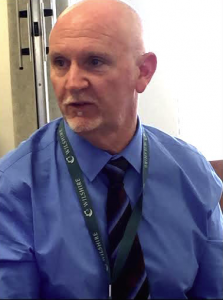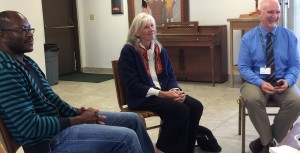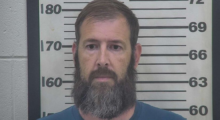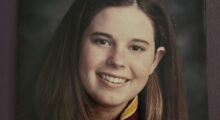Steven Willey began his hospice career in 1995 as a volunteer and home health aide for San Luis Obispo County Home Health and Hospice. In 1997, he became Volunteer Coordinator for Hospice of San Luis Obispo County, where he remained until joining Wilshire Hospice in 2011. Steve has degrees in both psychology and social sciences and completed the “Sacred Art of Dying” course at the Sacred Art of Living Center in Oregon. In 2001, he helped found the Supportive Care Services Program at the California Men’s Colony, which trains inmates to provide compassionate end-of-life support for fellow inmates. His role at Wilshire Hospice includes the training, supervision and nurturing of hospice volunteers.
Carla: What originally inspired you to work within the field of death & dying?
Steven: I came to work accidentally, hoping it would give me tools I needed when I was left alone in the hospital with patients who’d passed. I wanted to feel more skilled when interacting with the families. One night, watching a video about ‘Healing Touch,’ the thing that spoke to me was seeing a nurse sitting with a dying patient. Here was a person who was just sitting with a dying person. She was brave enough and compassionate enough to just sit there. This has colored everything since I began. Everything is about presence, first and foremost, no matter what your role is within the hospice team.
Carla: Death is tricky. Everyone moves toward death differently and processes grief in ways that are unpredictable. Sometimes there is love and peacefulness; sometimes anger, distancing, argument. What qualities within yourself did you cultivate in order to become skillful and present under difficult circumstances?
Steven: For me, the ability to acknowledge and let go of what I can’t change is crucial (and very comforting). Harder, but as important, is being non-judgmental both of others and myself…as in judging my limitations. I work all the time at being invested in my intentions more than in their outcomes. I believe if the good or positive intention is there, most of the time the outcome will be good whether I actually see it or not.
Carla: Is hospice training standardized throughout the industry? How did you decide on the particular curriculum you teach?
Steven: There are certain topics that must be covered in all hospice trainings. How those topics are covered and what additional topics are presented are up to the individual hospice. Trainings usually run 18-20 hours, but I find that’s barely enough time to cover what we are supposed to cover and still go deeper into more experiential work like guided imagery, role play and group exercises. I try to offer more extended time with the volunteers throughout the year on topics like “Life Review” and “Reminiscence and Legacy.” The training I offer has its roots in the original hospice training as it was given in this county back in the early ‘90s. I am still friends with many of the folks who set that up. Of course I have altered it as the years have gone by and I have added to my own experience. That original hospice spirit is (I hope!) still intact. In any case, I believe it’s a better, more meaningful way to train than individually on a computer.
Carla: What qualities do you look for in hospice volunteers?
Steven: Flexibility and openness are absolutely essential. A comfort with ‘mystery’ and being okay with ‘not knowing’ is crucial to the longevity of doing this work, particularly with volunteers.
Carla: People who choose to work within this field are often motivated by the depths of their own personal experience. Have you encountered times when the intersection between a volunteer’s personal wounds conflicts with their ability to care for others?
Steven: It’s common and natural for hospice caregivers to have their own grief to take care of, but I’ve found that sometimes professionalism masks pain in really difficult ways to get at. A young psychology student participated in my very first training in 1997. A professor in communications came in to speak. He did a role play with her about communication. She fell apart and left. She had learned to work with others, but had never learned to work with herself. During another training, there was a woman who was a psychiatrist — extremely smart and very intimidating to me intellectually. She kept at me throughout the entirety of the training trying to make me go ‘deeper’ with the trainees. During the final interview, she broke down in tears, overwhelmed by the feeling of powerlessness in face of working with the dying.
Please come back next week for part two of our interview with Steven.

 Who Guides Hospice Volunteers? An Interview with Steven Willey, Hospice Volunteer Manager, Part One
Who Guides Hospice Volunteers? An Interview with Steven Willey, Hospice Volunteer Manager, Part One




 Funeral Home Owner Chris Johnson Spending Halloween in Jail
Funeral Home Owner Chris Johnson Spending Halloween in Jail
 Our Monthly Tip: Toast a Loved One with a Personalized Glass
Our Monthly Tip: Toast a Loved One with a Personalized Glass
 My Cousin’s Death Taught Me the Meaning of Life
My Cousin’s Death Taught Me the Meaning of Life














